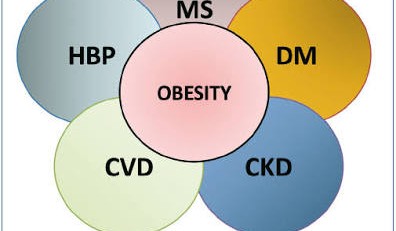Hypothyroidism
Hypothyroidism Or Under Active Thyroid Gland
Thyroid is a butterfly shaped endocrine gland situated at the base of the neck, below the prominence of the Adam’s apple, resting on the trachea or the windpipe.
It produces three hormones, the two thyroid hormones called triiodothyronine or T3 and thyroxine or the T4 hormones and calcitonin.
The two thyroid hormones control the metabolic rate, synthesis of proteins and the growth and development of children.
Calcitonin is involved in calcium homeostasis that is, it takes up calcium from the blood and deposits it in bones.
The two thyroid hormones are regulated by thyroid stimulating hormone or TSH, which is secreted by the master endocrine gland, the pituitary and the production of TSH in turn is regulated by a hormone called the thyrotropin releasing hormone or the TRH, produced by the hypothalamus, a part of the brain.
It means the final control of the thyroid gland lies with the brain.
***
Hyperthyroidism and hypothyroidism:
When the thyroid gland produces excess thyroid hormones, it results in hyperthyroidism while when it produces low levels of the thyroid hormones, it results in hypothyroidism.
Hypothyroidism is more common in women and in people over 60.
The commonest cause of hypothyroidism all over the world is deficiency of iodine in food and most countries have tackled the problem by iodising the salt available to its population.
A condition called Hashimoto’s thyroiditis or Hashimoto’s disease, an autoimmune disease of the thyroid gland, is the common cause of hypothyroidism in areas where there is no iodine deficiency in the population. It gradually destroys the gland.
***
Hypothyroidism:
Hypothyroidism can cause a variety of symptoms including fatigue, intolerance of cold, slow pulse rate, anaemia, depression, constipation, dyspepsia, muscle weakness, shortness of breath, hoarseness of voice, hair loss, dry, rough skin, weight gain, heavy menstruation in ladies and weight gain.
Apart from depression, hypothyroidism is also known to accompany severe psychiatric disorders like bipolar disorder, mood disorders and schizophrenia.
It can occur also in pregnancy. Not treating hypothyroidism during pregnancy can lead to delayed growth and low intellectual development of the baby.
Mild or sub clinical hypothyroidism too can cause infertility and miscarriages and can also cause a grave pregnancy condition called pre-eclampsia, a condition in which there is rise in the blood pressure and loss of significant amounts of protein in urine. Gestational diabetes is also seen in hypothyroidism in pregnancy.
In mild or sub clinical hypothyroidism the TSH levels are raised but the thyroid hormone levels are normal.
***
The diagnosis and the treatment:
Many times, the patient of hypothyroidism is the last to complain about the condition. Often a family doctor may suspect the disease seeing sudden weight gain, deteriorated skin and changes in voice in a regular patient plus probably dulled comprehension reflected in speech and eyes, suspects hypothyroidism.
A doctor will usually suspect hypothyroidism when she or he sees that your skin and hair are dry and rough, there is coldness and swelling of extremities and your heart rate is slow (bradycardia). He may also see delayed relaxation of tendons on testing the tendon reflexes and a kind of non pitting oedema called myxoedema.
Thyroid function lab tests include checking the blood levels of the pituitary hormone TSH and levels of the thyroid hormones T3 and T4.
High blood levels of TSH and / or low levels of T3 and T4 are diagnostic of hypothyroidism.
Hypothyroidism is treated by your doctor with levothyroxine, a synthetic form of the thyroxine hormone or T4.
Levothyroxine is safe in pregnancy.
Your doctor will order regular lab checks of your blood levels of TSH, T3 and T4 (thyroid function test) and adjust the dose of your medication based on the severity of the symptoms and the levels of the hormones, from time to time.
That is the reason why you have to check your thyroid function and see your doctor at regular intervals as advised by your doctor.
***
The weight gain due to hypothyroidism is of mild to moderate degree. A huge weight gain is unlikely to be caused by hypothyroidism.
Many slimming programs tell people under their treatment that they haven’t lost weight because they have hormonal problems.
The commonest hormonal problems related to obesity are PCOD and hypothyroidism.
It doesn’t matter whether your weight gain is due to PCOD or hypothyroidism.
You still have to eat healthy and at least walk adequately to slim down perfectly and overcome PCOD and most likely help your doctor to reduce your levothyroxine dose considerably.
And people unfailingly do succeed, if they do.
The people on these slimming programs didn’t fail because they had hormonal problems, but because the treatments themselves were unscientific.
Also read the articles, ‘Basics Of Nutrition’, ‘The Science Of Exercise’ and the ‘Simple Steps To Slimming’ and ‘Health Problems Of The Young: PCOD‘ on this website.
***
हायपोथायरॉयडिझम!
थायरॉईड ही एक फुलपाखराच्या आकाराची एन्डोक्रिन ग्लॅन्ड (ग्रंथी) आहे.
ही ग्लॅन्ड गळ्यातील ॲडम्स ॲपल ह्या उचंवट्या खाली ट्रकिया किंवा विंड पाइप वर बसलेली असते.
ती ट्रायआयोडोथायरोनाईन किंवा ‘टी 3’ आणि थायरॉक्झिन किंवा ‘टी 4’ ही दोन थायरॉईड हॉर्मोन्स आणि कॅल्सिटोनिन ही तीन हॉर्मोन्स निर्माण करते.
ह्या पैकी ही दोन थायरॉईड हॉर्मोन्स ही मेटबॉलिझम, प्रोटीन सिन्थेसिस आणि लहान मुलांची वाढ आणि डिव्हेलपमेंट नियंत्रित करते, तर कॅल्सिटोनिन हे रक्तातील कॅल्शियम हाडांमध्ये डिपॉझिट करते.
ही दोन थायरॉईड हॉर्मोन्स पिच्युअटरी ही मास्टर एन्डोक्रिनल ग्लॅन्ड ‘टी एस एच’ (TSH) ह्या हार्मोन ने कंट्रोल करते तर ‘टी एस एच’ हे हार्मोन, मेंदू च्या तळाशी असलेले हायपोथलॅमस, थायरोट्रोपिन रिलीझिंग हार्मोन किंवा ‘टी आर एच’ ने कंट्रोल करते.
म्हणजेच ह्या सर्व हॉर्मोन्स वर नियंत्रण अखेर मेंदू चे असते.
***
जेव्हा थायरॉईड ग्लॅन्ड गरजे पेक्षा अधिक थायरॉईड हॉर्मोन्स निर्माण करते, तेव्हा हायपरथायरॉयडिझम तर गरजे पेक्षा कमी थायरॉईड हॉर्मोन्स निर्माण करते तेव्हा हायपोथायरॉयडिझम हे आजार निर्माण होतात.
हायपोथायरॉयडिझम हे स्त्रिया आणि वयाच्या साठीच्या पुढच्या लोकांमध्ये अधिक प्रमाणात आढळते.
हायपोथायरॉयडिझम चे जगातील प्रथम कारण अन्नात आयोडीन ची कमी हे आहे.
आणि जगातल्या अनेक देशांनी मीठा मध्ये आयोडीन ॲड केल्याने जगातील हायपोथायरॉयडिझम चे प्रमाण खूप कमी झाले आहे.
जगातील मिठात आयोडीन ॲड केलेल्या भागात, हशिमोटो थायरॉयडायटीस किंवा हशिमोटो डिसीझ हा ऑटोइम्यून आजार हा हायपोथायरॉयडिझम प्रमुख कारण आहे. ह्या आजारात थायरॉईड ग्लॅन्ड हळू हळू नष्ट होते.
हायपोथायरॉयडिझम मध्ये थकवा, थंडी सहन न होणे, स्लो पल्स रेट, डिप्रेशन, कॉनस्टिपेशन, अपचन, स्नायूंचा वीकनेस, श्वास घ्यायला त्रास होणे, आवाजात होर्सनेस येणे, केस रफ होणे आणि गळणे, स्किन रफ होणे, वजन वाढणे, स्त्रियांमध्ये पाळी मध्ये खूप ब्लीडिंग होणे अशी लक्षणे दिसतात.
डिप्रेशन शिवाय ही बायपोलर डिसऑर्डर, मूड डिसऑर्डर्स, स्किट्झोफ्रेनिया ह्या सारखे गंभीर सायकियाट्रिक आजार ही हायपोथायरॉयडिझमशी संबंधित असू शकतात.
***
हायपोथायरॉयडिझम प्रेग्नन्सी मध्ये ही होऊ शकते.
काही लोकांना प्रेग्नन्सी मध्ये आलेल्या हायपोथायरॉयडिझम वर औषधे घेणे सुरक्षित आहे का ह्याची काळजी वाटते.
प्रत्यक्षात प्रेग्नन्सी मध्ये आलेल्या हायपोथायरॉयडिझम वर औषधे घेणे सुरक्षितच नव्हे तर अत्यावश्यक ही आहे.
प्रेग्नन्सी मध्ये आलेल्या हायपोथायरॉयडिझम वर योग्य उपचार न झाल्यास त्याचा परिणाम बाळाच्या वाढीवर आणि बौधिक विकासावर वर ही होऊ शकतो.
अनेक लोकांमध्ये हायपोथायरॉयडिझम सबक्लिनिकल सुध्दा असू शकते. ह्यात थायरॉईड हॉर्मोन्स च्या लेव्हल्स नॉर्मल असतात पण ‘टी एस एच’ ह्या पिच्युटरी हॉर्मोन च्या लेव्हल्स वाढलेल्या असतात.
अगदी माइल्ड किंवा सबक्लिनिकल हायपोथायरॉयडिझम मुळे सुध्दा वंध्यत्व किंवा प्रेगनन्सी मध्ये आल्यास गर्भपात होऊ शकतो.
तसेच प्रीइक्लाम्पशिया हा अतिशय गंभीर आजार ही होऊ शकतो. ह्या आजारात ब्लड प्रेशर एकदम वाढते आणि लघवीतून मोठ्या प्रमाणात प्रोटीन्स शरीरा बाहेर पडतात. ह्या आजारातून पुढे आई ला कनव्हलशन्स ही येऊ शकतात, ह्या आजाराला इक्लाम्पशिया म्हणतात. हे आजार आई आणि बाळाच्या जीवाला घातक ठरू शकतात.
***
डायग्नोसिस आणि ट्रीटमेंट
हायपोथायरॉयडिझम ह्या आजारात सुरुवातीला तर पेशंट स्वत: काहीच तक्रार न करण्याची शक्यता असते, कारण तिला काही त्रास न जाणवण्याची शक्यता असते.
बऱ्याच वेळा नेहमीच्या पेशंट चे वजन अचानक थोडे फार वाढलेले दिसणे, आवाजात बदल (होर्सनेस, आवाज बसल्या सारखा, काहीसा घोगरा) झालेला जाणवणे, पेशंटच्या हालचाली आणि आकलन (कॉम्प्रिहेन्शन) मंदावलेले दिसणे, केस आणि स्किन ड्राय आणि रफ झालेले दिसणे असे बदल जाणवल्याने फॅमिली डॉक्टरांनाच हायपोथायरॉयडिझम चा संशय येऊ शकतो.
पण हल्ली फॅमिली डॉक्टर ही संस्थाच (इन्स्टीट्यूशन) फारशी शिल्लक नसल्याने, असे डायग्नोसिस होणे इतर काही कारणांसाठी कन्सल्टंट ने तपासल्या आणि ब्लड टेस्ट केल्यावरच होणे अधिक संभवते.
डॉक्टरांसाठी तपासणीत तुमचे केस आणि स्किन ड्राय आणि रफ असलेले आढळणे, हात पाय काहीसे थंड असणे आणि त्यांवर सूज सापडणे, आणि हार्ट रेट स्लो असल्याचे दिसणे, स्किन वर दाबून पाहिल्यास खड्डा न पडणारी सूज (नॉन पिटिंग इडीमा, ह्याला मिक्सिडीमा म्हणतात) दिसणे आणि स्लो रिलॅक्सेशन ऑफ टेंडन रीफ्लेक्स आढळणे ह्या हायपोथायरॉयडिझम च्या साईन्स असतात.
थायरॉईड फन्क्शन ह्या ब्लड टेस्ट्स मध्ये ‘टी एस एच’, ‘टी 3’ आणि ‘टी 4’ ह्या थायरॉईड हॉर्मोन्सच्या लेव्हल्स तपासल्या जातात.
हायपोथायरॉयडिझम मध्ये फक्त ‘टी एस एच’ च्या लेव्हल्स वाढलेल्या आढळतात किंवा टी 3 आणि टी 4 ह्यांच्या लेव्हल्स कमी झालेल्या ही आढळतात.
तुमचे डॉक्टर तुम्हाला लीव्होथायरॉक्झिन ह्या सिंथेटीक थायरॉक्झिन हॉर्मोन सप्लिमेंट देऊन तुमचे हायपोथायरॉइडिझम ट्रीट करतात.
लीव्होथायरॉक्झिन घेणे प्रेग्नन्सी मध्ये ही सुरक्षित असते. आणि तुमच्या डॉक्टरांनी ते प्रिस्क्राईब केले तर ते घेणे अत्यावश्यक ही आहे.
तुमचे डॉक्टर तुम्हाला ठराविक महिन्यांनी थायरॉईड फन्क्शन रिपोर्ट करून घेऊन चेकअप साठी बोलावतात आणि तुमची लक्षणे आणि रीपोर्ट वरून तुमचा लीव्होथायरॉक्झिन चा डोस अजस्ट करतात, म्हणजेच तो काही वेळा थोडा कमी जास्त ही होऊ शकतो.
त्यामुळे नियमित थायरॉईड फन्क्शन चेक करणे आणि तुमच्या डॉक्टरांना नियमित भेटणे आवश्यक आहे.
***
हायपोथायरॉयडिझम मुळे होणारे वेट गेन थोडे ते मध्यम स्वरूपाचे असते. तुमचे वजन खूप वाढलेले असेल, तर ते हायपोथायरॉयडिझम मुळे असण्याची शक्यता कमी असते.
जर तुमची वजनाची ट्रीटमेंट देणारे, तुमचे वजन हॉर्मोन्स मुळे कमी होत नाही, असे सांगत असतील, तर ते खोटे आहे.
त्यांच्या ट्रीटमेंट वर तुमचे वजन कमी होत नसेल, तर ते त्यांची ट्रीटमेंट अनसायंटिफिक असल्याने आहे, ते तुम्ही कमी पडल्याने किंवा तुमच्या हॉर्मोन्स मुळे नाही हे लक्षात ठेवा!
वजन वाढवू शकणारे दोन कॉमन एन्डोक्रिनल आजार म्हणजे पीसीओडी आणि हायपोथायरॉईडिझम.
तुम्ही जर योग्य, संतुलित आहार घेतला आणि पुरेसे चालला तर हायपोथायरॉयडिझम काय किंवा पीसीओडी काय, तुमचे वजन कमी होणे थांबवू शकत नाहीत!
आणि तुमचे वजन कमी झाले तर तुमचे डॉक्टर तुमचा लीव्होथायरॉक्झिनचा डोस कमी ही करू शकतात किंवा तुम्हाला पीसीओडी असेल तर तो रिव्हर्स ही होऊ शकतो.
त्या साठी उपासमार किंवा अतिरेकी व्यायाम ह्या दोन्हींची अजिबात गरज नाही! h

















Leave a Reply